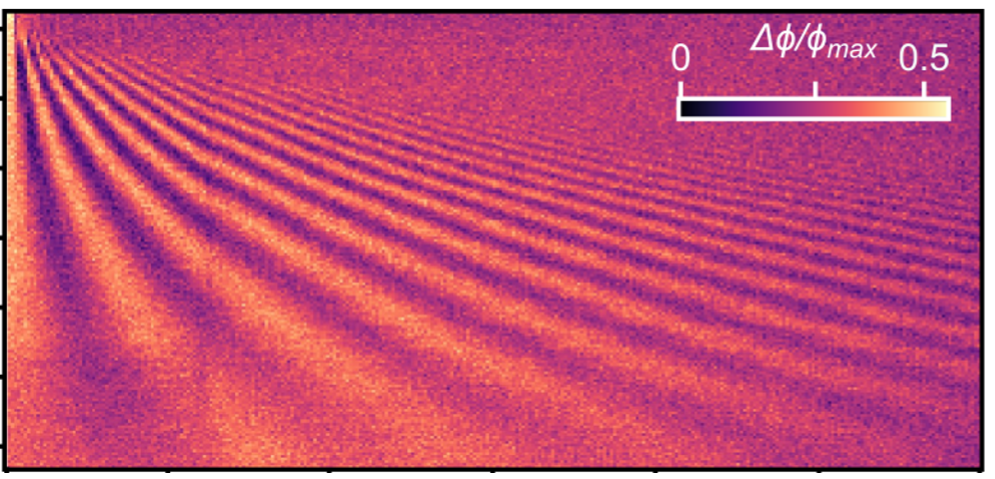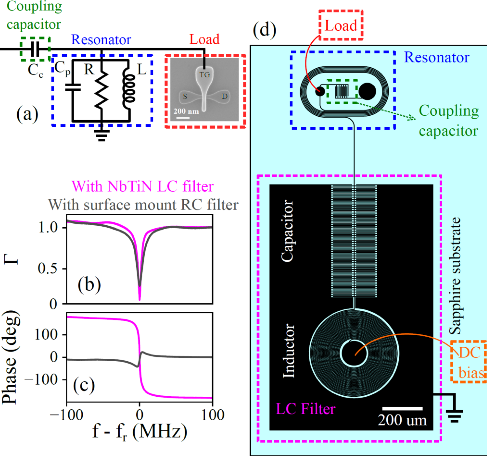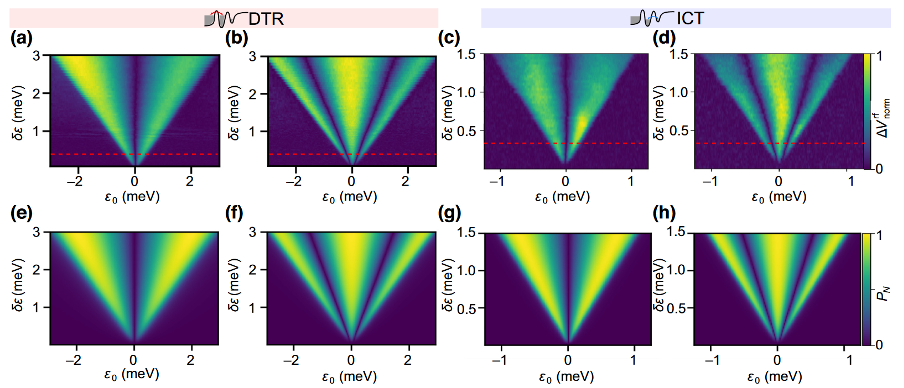Research Lines
The Quantum Hardware group at CIC nanoGUNE focuses on the development of physical hardware for quantum information processing using devices based on semiconducting, superconducting and hybrid materials.
Silicon-based quantum computing

We leverage the very same hardware that is used in standard electronics, the silicon transistor, for quantum computing applications.
We leverage the very same hardware that is used in standard electronics, the silicon transistor, for quantum computing applications.
Quantum charge/spin sensing

We use semiconducting-superconducting hybrid systems to reach the ultimate limits of charge and spin detection sensitivity.

We use semiconducting-superconducting hybrid systems to reach the ultimate limits of charge and spin detection sensitivity.
Quantum-dots based microwave devices

We use semiconductor quantum dots at microwave frequencies to demonstrate new and more efficient electronic devices and circuits such as amplifiers, multipliers and sensors.

We use semiconductor quantum dots at microwave frequencies to demonstrate new and more efficient electronic devices and circuits such as amplifiers, multipliers and sensors.
Related Publications
Edward J. Thomas, Virginia N. Ciriano-Tejel, David F. Wise, Domenic Prete, Mathieu de Kruijf, David J. Ibberson, Grayson M. Noah, Alberto Gomez-Saiz, M. Fernando Gonzalez-Zalba, Mark A. I. Johnson, John J. L. Morton
NATURE ELECTRONICS (2025)
Rapid cryogenic characteriZation of 1,024 integrated silicon quantum dot devices
L. Peri, M. Benito, C. J. B. Ford and M. F. Gonzalez-Zalba
NPJ QUANTUM INFORMATION 10, 114 (2024)
Unified linear response theory of quantum electronic circuits
G. M. Noah, T.H. Swift, M. de Kruijf, A. Gomez-Saiz, J. J. L. Morton, M.F. Gonzalez-Zalba
Applied Physics Review 11, 021414 (2024)
CMOS on-chip thermometry at deep cryogenic temperatures featured
S. M. Patomäki, M. F. Gonzalez-Zalba, M. A. Fogarty, Z. Cai, S. C. Benjamin & J. J. L. Morton
NPJ QUANTUM INFORMATION 10, 31 (2024)
Pipeline quantum processor architecture for silicon spin qubits
T. Lundberg, D. J. Ibberson, J. Li, L. Hutin, J. C. Abadillo-Uriel, M. Filippone, B. Bertrand, A. Nunnenkamp, C. Lee, N. Stelmashenko, J. W. A. Robinson, M. Vinet, L. Ibberson, Y.M. Niquet & M. F Gonzalez-Zalba
NPJ QUANTUM INFORMATION 10, 28 (2024)
Non-symmetric Pauli spin blockade in a silicon double quantum dot
L. Peri, G. A. Oakes, L. Cochrane, C. J. B. Ford, and M. F. Gonzalez-Zalba
QUANTUM 8, 1294 (2024)
Beyond-adiabatic Quantum Admittance of a Semiconductor Quantum Dot at High Frequencies: Rethinking Reflectometry as Polaron Dynamics
Felix-Ekkehard von Horstig, David J. Ibberson, Giovanni A. Oakes, Laurence Cochrane, David F. Wise, Nadia Stelmashenko, Sylvain Barraud, Jason A.W. Robinson, and Frederico Martins et al.
PHYSICAL REVIEW APPLIED 21, 044016 (2024)
Multimodule microwave assembly for fast readout and charge-noise characterization of silicon quantum dots
S. M. Patomäki, J. Williams, F. Berritta, C. Lainé, M. A. Fogarty, R. C. C. Leon, J. Jussot, S. Kubicek, and A. Chatterjee et al.
PHYSICAL REVIEW APPLIED 21, 054042 (2024)
Elongated quantum dot as a distributed charge sensor
M. F. Gonzalez-Zalba, S. de Franceschi, E. Charbon, T. Meunier, M. Vinet & A. S. Dzurak
NATURE ELECTRONICS 4, 872–884 (2021)
Scaling silicon-based quantum computing using CMOS technology
Not published ARXIV papers
Lorenzo Peri, Felix-Ekkehard von Horstig, Sylvain Barraud, Christopher J. B. Ford, Mónica Benito, M. Fernando Gonzalez-Zalba
[Submitted on 23 Oct 2024]
Polarimetry With Spins in the Solid State
Jacob F. Chittock-Wood, Ross C. C. Leon, Michael A. Fogarty, Tara Murphy, Sofia M. Patomäki, Giovanni A. Oakes, Felix-Ekkehard von Horstig, Nathan Johnson, Julien Jussot, Stefan Kubicek, Bogdan Govoreanu, David F. Wise, M. Fernando Gonzalez-Zalba, John J. L. Morton
[Submitted on 2 Aug 2024]
Exchange control in a MOS double quantum dot made using a 300 mm wafer process
Felix-Ekkehard von Horstig, Lorenzo Peri, Sylvain Barraud, Sergey N. Shevchenko, Christopher J. B. Ford, M. Fernando Gonzalez-Zalba
[Submitted on 19 Jul 2024]
Floquet interferometry of a dressed semiconductor quantum dot
Felix-Ekkehard von Horstig, Lorenzo Peri, Sylvain Barraud, Jason A. W. Robinson, Monica Benito, Frederico Martins, M. Fernando Gonzalez-Zalba
[Submitted on 19 Mar 2024]
Electrical readout of spins in the absence of spin blockade
Industrial collaborations

Our group works in close collaboration with the leading quantum computing scale-up company Quantum Motion, a UK-based company dedicated to the development of silicon-based quantum computing hardware.
Academic collaborators
Christopher Ford
University of CambridgeJason WA Robison
University of CambridgeMonica Benito
Augsburg UniversityAndras Palyi
Budapest University of Technology and Economics (BME)
Hardware Cuántico news
Donostia, capital de la espintrónica y la orbitrónica
El congreso Spin & Orbit, organizado por CIC nanoGUNE, reúne a la comunidad científica para debatir sobre la electrónica del futuro. Más de 100 expertos y expertas internacionales en espintrónica y orbitrónica se dan cita en Donostia esta semana en busca de tecnologías...Read more
